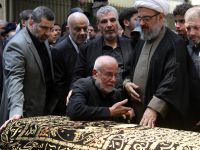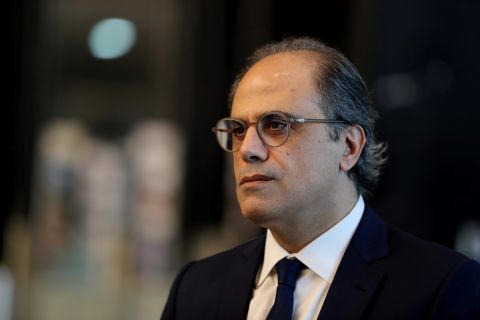Former US Secretary of State Richard Murphy said that he didn’t believe a final settlement on the Palestinian-Israeli peace track could be reached before US President Bill Clinton leaves office.
In an extensive interview with Albawaba.com, Murphy said that the lack of progress on the peace track may cause the upcoming presedential candidates to focus on other issues rather than the peace process.
Murphy talked to Albawaba.com about various issues of concern in the Middle East, including those of Syria in the new era, Lebenese elections and the sanctions imposed on Iraq. Following are excerpts from the interview:
Q: Do you think America’s present interest in moving the Palestinian-Israeli peace process forwards is motivated by Clinton’s drive to achieve peace before he leaves office, or is it due to the forthcoming elections?
A: I think it’s both. It’s partly driven by Clinton’s search for a legacy for himself and his administration. But I don’t think it matters what the motivation is if something good comes out of the initiative.
Every four years, we go through an election cycle and hold a major election. In fact, as soon as we have finished with one election, we begin to plan for the next one. In America, it’s always election time. I was surprised that at this point, we could cut through the underbrush and go directly to the issues which we should have been discussing for the past three years. The agreement in Oslo was that these discussions should start in the third year. We started perhaps only months before the Camp David conference was called. I got the sense of some fresh and significant movements of position on the Israeli side, particularly from Barak who, as you know, is violently opposed by the Likud and makes many of his fellow Israelis nervous because of the moves he has made.
Although I was not party to what went in the Camp David talks, I didn’t see anything in public about changes from the Palestinian side. The chairman went in with his positions and he came out with the same positions. He was apparently unaffected by his exchanges with Barak. Clinton has been accused of being terribly biased in his comments after Camp David, praising Barak’s creativity and, by implication, saying that Arafact was not creative. I think, however, that you need to interpret that comment not as being biased in the usual sense of the word as it is used by Arab observers. I think Clinton was trying to give a hand to Barak in terms of his domestic situation back in Israel where he ran into a firestorm on his return.
Q: Do you believe that a final settlement can be reached before Clinton leaves office?
A: Can a final settlement by reached in these last weeks of the Clinton administration and before the Israeli Knesset reconvenes on October 29th? I doubt it, but I would like to think that what happened at Camp David was not wasted. The positions which were put on the table are not going to be forgotten.
This is of course what Ariel Sharon said, you can’t just say that it’s now all withdrawal. Once you’ve walked away from Camp David without a final agreement, the Palestinians will take those positions and either build on them, or pocket them and ask for something else. Camp David changed thinking in Israel about what would be possible, what they could give, whether they had moved far enough, and whether the Palestinians have signaled in private a readiness to adjust their positions somewhat. I don’t know about the second part ( the Palestinian view ) because all I hear is a return to June 4, including all of east Jerusalem, in accordance with 242. I would remind you that historically, this is not an exact situation since 242 calls for withdrawal from territories, not from the territories. I doubt whether we can expect an agreement on the final status issues in this short time frame.
Q. Do you expect changes in American policy before the presidential election?
A. I don’t expect that you are going to see any significant change. Before the election, you’re going to hear each (candidate) say that the other is more dedicated to peace than the other and more supportive of Israel than his competitor. That’s politics, that’s the rhetoric, that’s the heat of the election campaign. In fact, I really hope that it’s not going to be a major topic for debate in these last weeks of the campaign because I don’t think it will help any closed- door negotiations. These are terribly difficult decisions for Palestinians and Israelis to make, and the full-blown public rhetoric and the high temperature, high voltage of an American election campaign will not necessarily produce useful results for the negotiators. What concerns me is that there is no tangible progress based on Camp David. Tangible progress need not mean a final agreement. I think the next president, whichever one is elected, is going to ask himself why the great deal of time and energy that Clinton invested in the peace process was not matched by significant results. The next president may feel that there are a lot of other problems that need his attention. As you know, there are many other problems around the world that make demands on the American president’s time and schedule. Particularly in this second administration, Clinton has spent a great deal of time and thought on what might work, what might prove to be acceptable. As Americans we’re looking, and have been looking from the beginning, for an agreement that would last, not an agreement that’s going to be imposed, or that is going to be so biased one way or the other that it proves to be fragile and breaks down in a short time.
For years, there has been a bipartisan support for the process and that’s why I am confident that there will still be interest in helping it (the peace process). What does worry me is whether the man on top will be ready to expose himself to the risks of such high wired diplomacy if something more doesn’t come out of Camp David than we’ve seen to date.
Q. If the Middle-East process is going to be put on the shelf, what will be the strategy for the Middle-East region of the candidates vying for the presidential post?
A. We have interests in the Middle East which require good working relationships with the Arab World as well as with Israel. I don’t deny a bias in American policy towards Israel, but there have been moments when American interests were directly engaged. Eisenhower, for example, was directly engaged at Suez and Bush at Madrid. When the American side found that the parties on the Arab and Israeli side were really serious about getting a deal and not just making speeches, they helped ( broker a settlement ). At Camp David, the first Camp David, for example, Carter showed that he was just as rough, or just as tough on Begin as he was with Anwar Sadat. The approach worked because both Begin and Sadat came to that meeting with a great deal of preparation, probably more preparation than went into the “son of Camp David.” Carter’s reputation, I think, came out of that very well in terms of an even-handed attempt to advance peace.
© 2000 Al Bawaba (www.albawaba.com)








